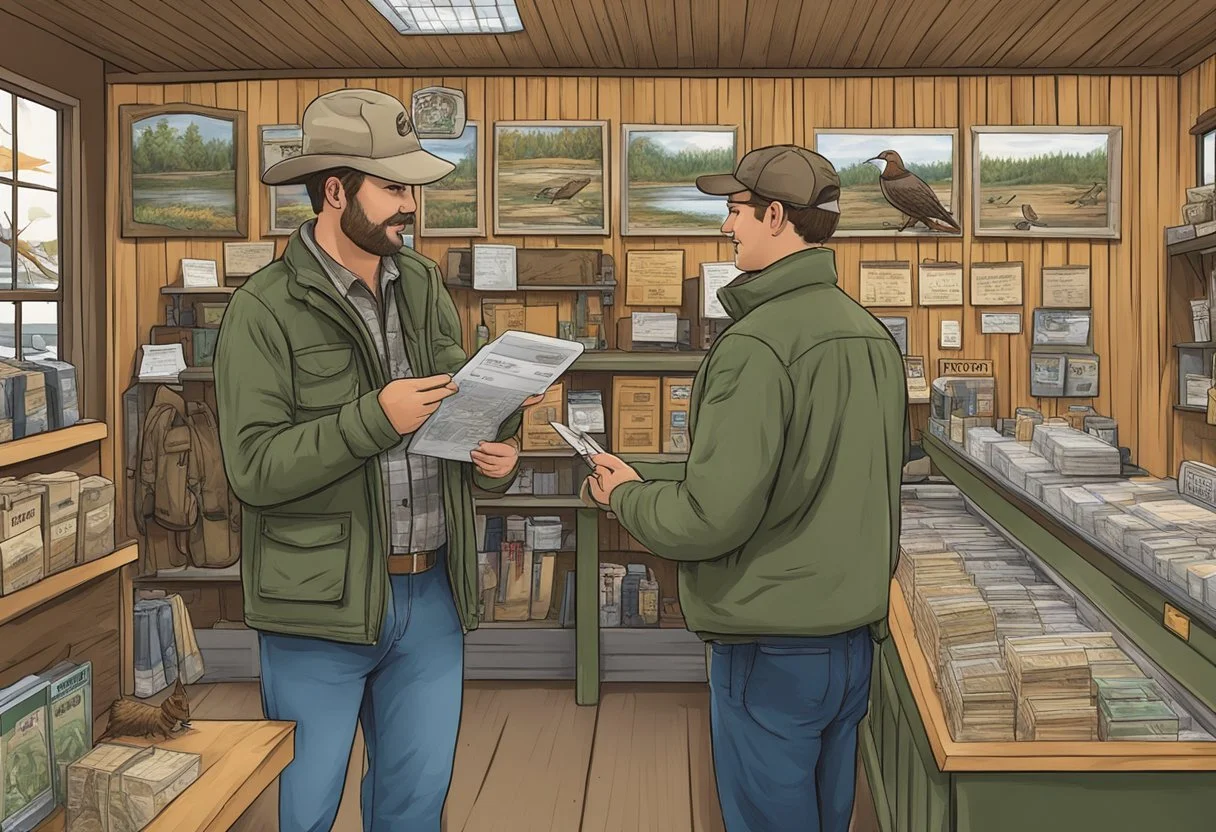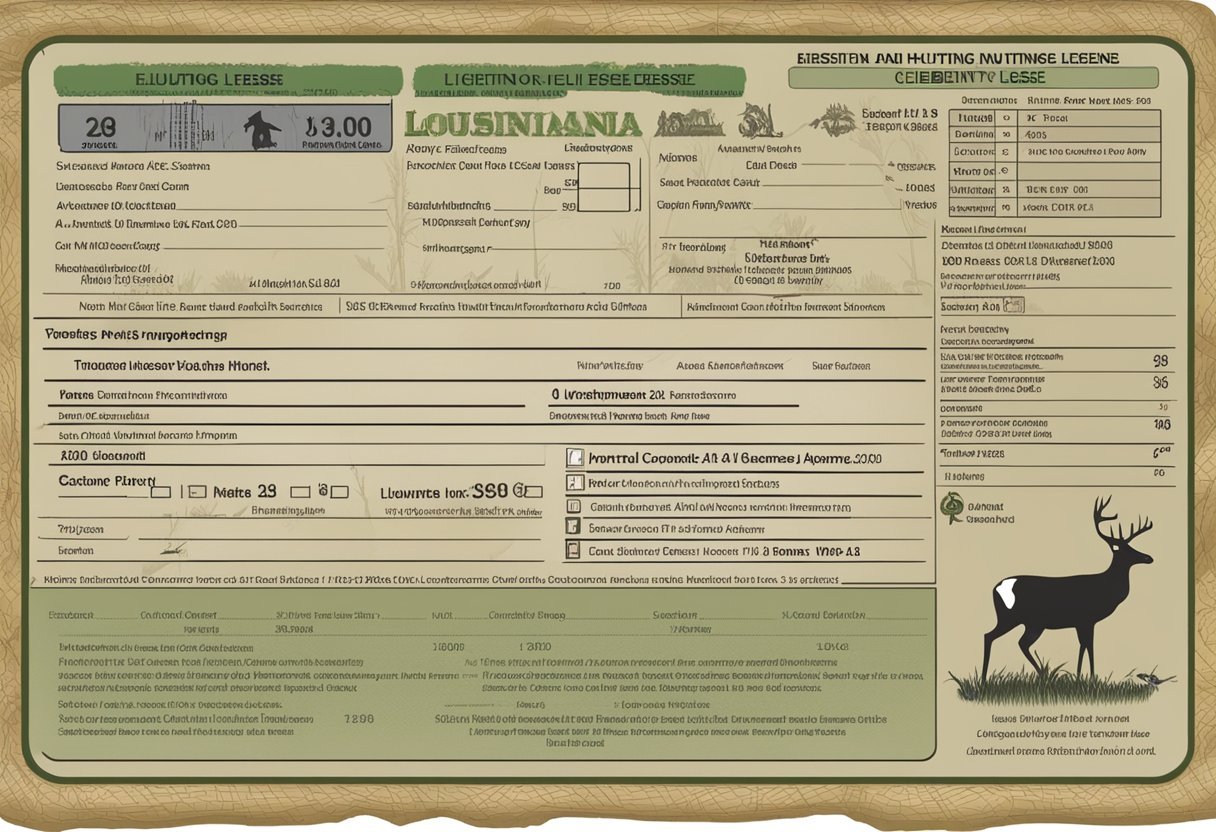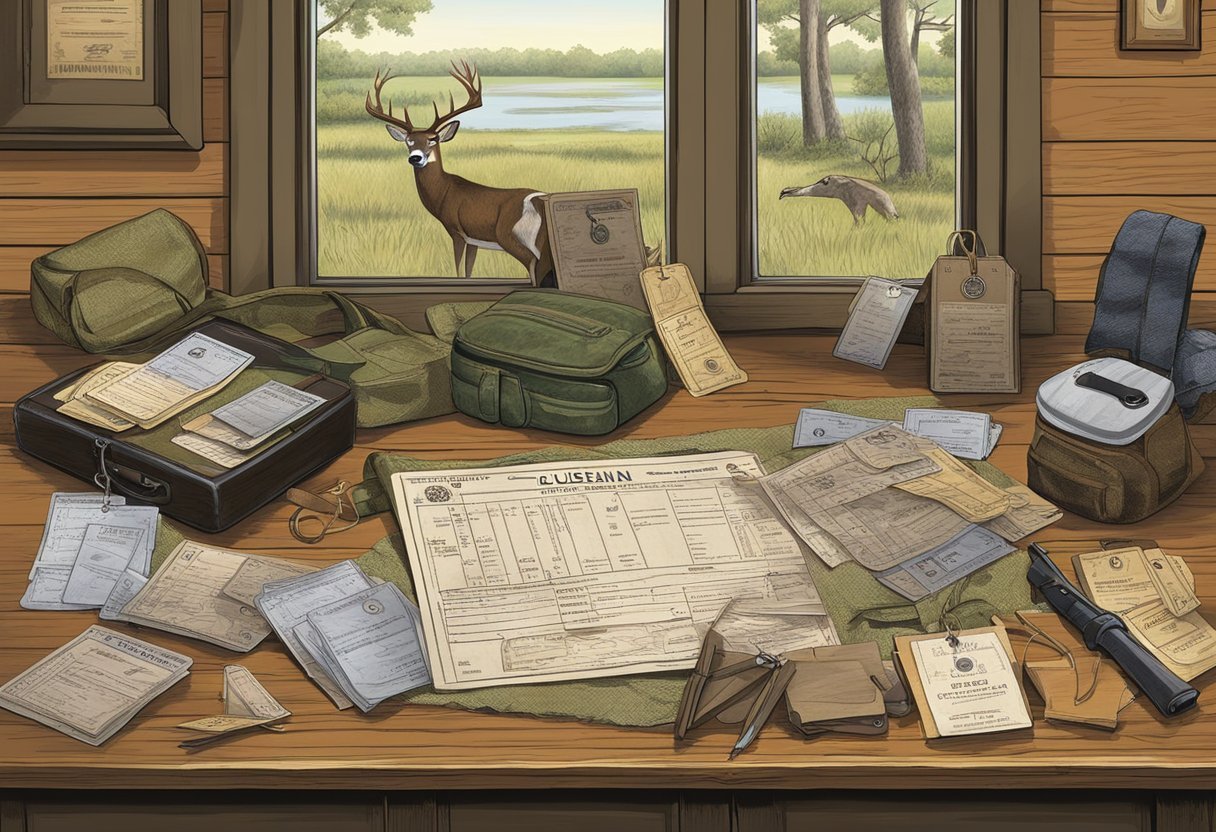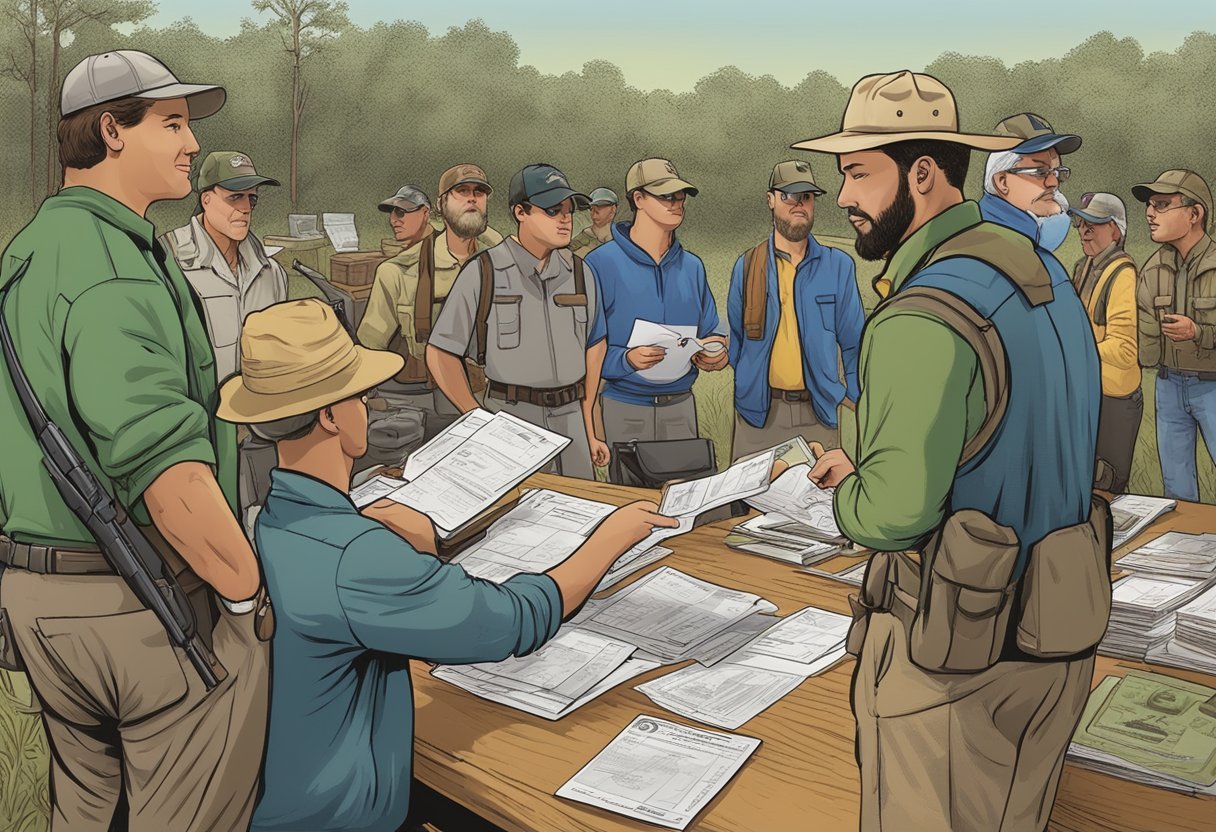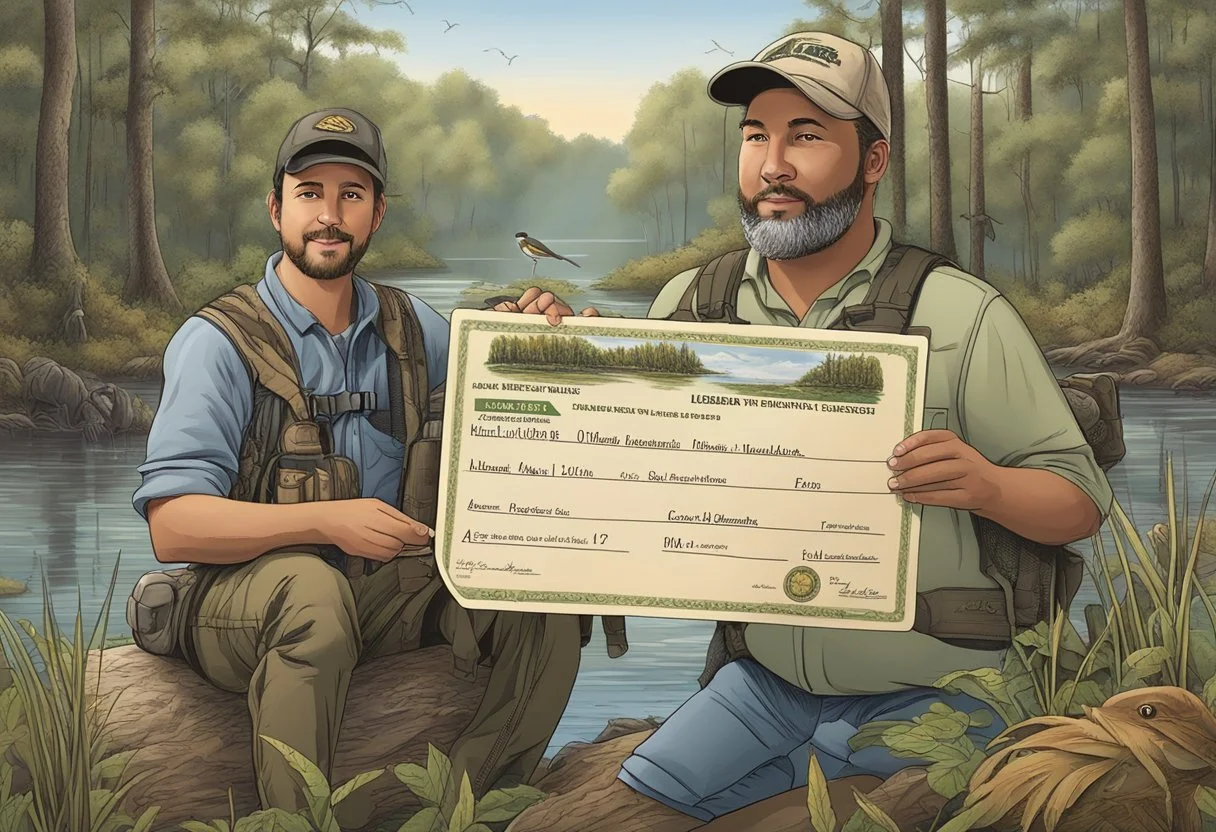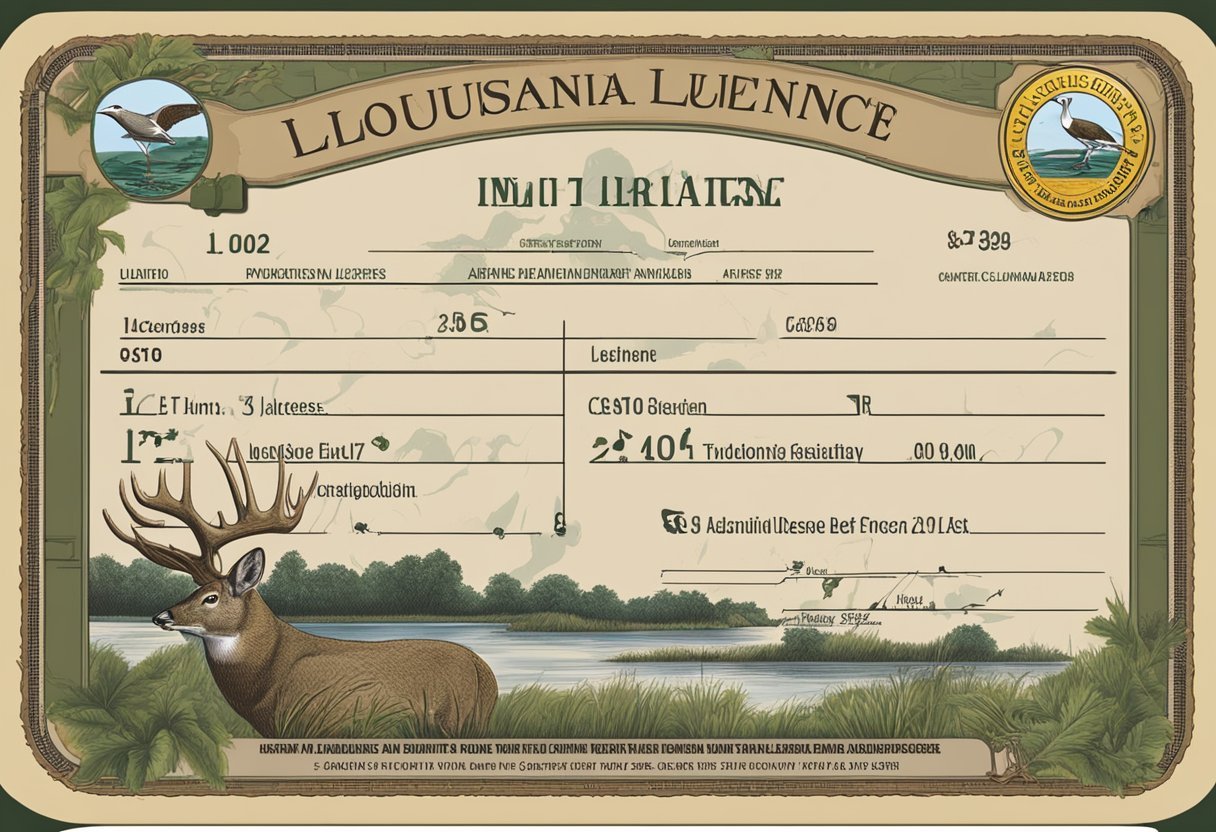How to Get a Louisiana Non Resident Hunting License
How to Easily Obtain Yours
This Article is Part of Our Guide to Non Resident Hunting Licenses by State
Non-resident hunters seeking to engage in hunting activities within the state of Louisiana are required to obtain the appropriate licensing before venturing into the field. The Louisiana Department of Wildlife and Fisheries (LDWF) manages the issuance of such licenses and stipulates that all hunters aged 18 and over, non-residents included, must secure a Basic Hunting License to hunt legally. This license is mandated for the pursuit, capture, possession, or transportation of any wild birds or quadrupeds for which the state has established hunting seasons.
The Louisiana non-resident hunting licenses are comprehensive and serve to ensure that all hunters are abiding by the regulations that have been set forth to conserve wildlife and promote safe hunting practices. Non-residents under the age of 18 are advised to obtain a youth license, which is specifically tailored for younger hunters. This youth license entails privileges to hunt species such as deer and turkey (What wine goes well with turkey?) and includes the necessary tags.
Furthermore, the LDWF website also provides vital resources and information regarding license fees, regulations, and online purchasing options. Non-residents planning to hunt on Wildlife Management Areas (WMAs), refuges, and conservation areas managed by LDWF should take note of additional permits that may be required. All necessary information and tools for compliance, including tag validation and lottery applications, are readily accessible through the department's licensing portal.
Eligibility and Types of Licenses
Louisiana offers a variety of hunting licenses to non-residents, including those in the military and individuals with disabilities. These licenses are mandatory for engaging in hunting activities within the state's boundaries.
Non-Resident License Requirements
Non-residents must obtain the appropriate licenses before hunting in Louisiana. The basic non-resident hunting license allows one to pursue game, though additional permits may be needed for specific species. Age and residency status are critical factors in determining eligibility for various licenses.
Types of Non-Resident Licenses
Non-residents can choose from several licenses based on the intended duration and type of hunting:
Basic Non-Resident Hunting License
Big Game License: Required for hunting deer, turkey, and other designated big game species.
Wildlife Management Area (WMA) Permit: Necessary for activities on WMAs, including hunting.
Bow Hunting and Primitive Firearms Licenses: For those who prefer traditional hunting methods.
Special Licenses for Military and Veterans
Active-duty military personnel and veterans may be eligible for discounted or special licenses. Retired military personnel are required to meet the same licensing requirements as other non-residents, unless otherwise specified by the Louisiana Department of Wildlife and Fisheries.
Licenses for Disabled Individuals
Disabled non-residents, including disabled veterans, may apply for special hunting licenses or permits, which may include additional privileges or accommodations to support accessible hunting opportunities._proof of disability may be required to qualify for these licenses.
Purchasing a License
When hunting in Louisiana, nonresidents are required to obtain appropriate licenses. Whether purchased online or in person, a hunter must have the correct license for the intended game. This section outlines the various ways to acquire a Louisiana nonresident hunting license and the associated fees.
Where to Purchase
Nonresidents can purchase a hunting license at Louisiana Department of Wildlife and Fisheries (LDWF) Headquarters at 2000 Quail Drive in Baton Rouge. Additionally, they may find licenses available at many local retailers across the state. It is important for hunters to ensure they are buying the correct type of license for the game they intend to hunt.
Online Purchase
For convenience, licenses can also be secured online through the LDWF's official website. This digital method is efficient and allows hunters to obtain their licenses without physical barriers. Online purchases require a valid email address and payment method. Hunters receive an electronic version of their license that can be printed or kept on a mobile device.
License Fees
License fees are distinct between residents and nonresidents and vary by the type of license and the game pursued. Nonresident hunters are advised to carefully review and select the appropriate license that aligns with their hunting activities in Louisiana. Fee schedules are available online and are subject to change, so it is always best to verify prices before purchasing.
Hunting Seasons and Regulations
In Louisiana, nonresident hunters must adhere to specific season dates and hunting regulations, including those pertinent to Wildlife Management Areas. Obedience to these rules ensures legal and ethical hunting practices across the state.
Season Dates
Deer Hunting: Dates vary by area and hunting method, with Archery Season typically opening in October and running through January. Firearms seasons have designated splits within this period.
Turkey Hunting: Spring season generally begins in late March and concludes in late April.
Small Game: Includes various species with seasons often starting in the fall and lasting until February or March, depending on the animal.
Hunting Regulations
Louisiana maintains a set of regulations to manage wildlife sustainability and hunter safety:
Licenses: Hunters aged 18 or older require a Basic Hunting License.
Tags: Mandatory for certain game like deer and turkey.
Bag Limits: Established for various species to prevent overharvesting.
Firearm Restrictions: Specific rules apply concerning legal firearms and ammunition.
Wildlife Management Areas
Access: Some areas require a WMA Access Permit for both residents and nonresidents.
WMA Regulations: Often have additional restrictions and seasons that can differ from statewide regulations.
Habitats: Each WMA is managed to preserve its unique habitat and wildlife, resulting in varied hunting opportunities and regulations.
By following these structured seasons and regulations, nonresident hunters can partake in Louisiana’s diverse hunting opportunities while contributing to the conservation of the state’s wildlife resources.
Specific Hunting Licenses
Louisiana offers a variety of specific hunting licenses to non-residents, allowing for legal participation in the pursuit of different types of game. Each license has its own regulations and stipulations, ensuring sustainable wildlife management and conservation.
Deer Hunting
Non-residents interested in deer hunting must obtain a Basic Hunting License and are eligible for a Non-Resident Deer License. Louisiana also implements a tagging system; deer hunters are required to electronically tag their harvest using the state's system.
Waterfowl and Federal Duck Stamps
For waterfowl hunting, a Basic Hunting License and a Louisiana Duck (What wine goes well with duck?) License are required. In addition to state licenses, hunters must purchase a Federal Duck Stamp when hunting migratory waterfowl.
Turkey Hunting
Hunters targeting turkeys need a Basic Hunting License and a separate Turkey License. The turkey season has specific dates that non-residents must adhere to, and electronic tagging of the turkey is mandatory following the harvest.
Small Game
The pursuit of small game such as rabbits and squirrels requires a non-resident to possess a Basic Hunting License. Some small game may have specified seasons and bag limits, important for maintaining healthy populations.
Big Game
Other than deer, big game in Louisiana may include animals like black bear or alligators, each requiring specific licenses and permits. Non-residents must secure relevant licenses and often need to enter lotteries or receive tags before they can hunt big game species.
Additional Hunting Permits and Tags
In Louisiana, specific permits and tags are essential for anyone participating in hunting activities. Understanding the requirements for the Harvest Information Program and game tags is crucial for compliance with state regulations.
Harvest Information Program (HIP)
The Harvest Information Program is mandatory for individuals intending to hunt migratory game birds. This program collects data on bird harvests, which assists in the management and conservation of these species. Hunters must register for HIP annually and carry proof during their hunting activities.
Game Tags and Reporting
For certain species, hunters in Louisiana must use game tags and adhere to reporting requirements. Tags are often issued with the specific hunting license, such as those for deer and turkey. Upon harvesting an animal, a hunter must fill out and attach the tag to the animal. Prompt reporting of the harvest is required following the guidelines provided by the Louisiana Department of Wildlife and Fisheries.
Fishing Licenses and Regulations
In Louisiana, non-resident anglers must adhere to specific licenses and regulations to legally fish in state waters. These requirements are in place to ensure sustainable fishing and conservation efforts.
Basic Fishing License
A Basic Fishing License is mandatory for non-residents who wish to fish in Louisiana's freshwaters. This license allows individuals to fish with the traditional rod and reel. For non-residents, the following applies:
Annual Basic Fishing License: Required for all anglers over the age of 16.
Duration and Cost: Valid for one year from the date of purchase. Fees vary.
Saltwater Fishing
To fish in Louisiana's saltwater areas, a non-resident must obtain a Saltwater Fishing License in addition to their Basic Fishing License. This permits fishing in marine and estuarine zones. Key points include:
License Requirement: Necessary for all non-resident anglers.
Coverage: Allows fishing in specified saltwater regions of the state.
Commercial Fishing Permits
For those interested in commercial fishing activities, Louisiana offers various Commercial Fishing Permits. This includes permits for operating in a commercial hunting preserve. Regulations for non-residents include:
Permit Types: Specific permits are required for different species and methods.
Application: Non-residents must apply and adhere to Louisiana's Department of Wildlife and Fisheries regulations.
These licensing requirements are essential for both conservation and the management of Louisiana's aquatic wildlife. Non-residents should ensure they are fully compliant with all state fishing regulations before beginning their fishing activities.
Wildlife Conservation and Management
In Louisiana, wildlife conservation and management are crucial components of the state’s environmental stewardship. These efforts are directly supported through mechanisms such as hunting license sales and specific activities on designated lands.
Hunter's Role in Conservation
Hunters play a pivotal role in conserving Louisiana's wildlife. Funds generated by the sale of hunting licenses are essential for wildlife management and habitat conservation. For instance:
Revenue Generation: Hunters contribute to conservation by purchasing licenses, permits, and tags needed for hunting in the state. The Basic Hunting License is mandatory for residents and nonresidents age 18 or older to hunt in Louisiana.
Habitat Support: The financial contributions from hunters support the state and federal lands set aside for wildlife and habitat stewardship.
WMA Conservation Practices
Wildlife Management Areas (WMAs) are significant for Louisiana’s conservation efforts:
Access and Usage: These areas require specific permits for various activities. The WMA Access Permit is particularly mandatory unless specified otherwise, highlighting the state's commitment to regulate and protect these areas.
Management Strategies: Careful management of WMAs, including habitat preservation and wildlife population monitoring, ensures sustainable use and biodiversity protection. These areas are managed by entities such as the Louisiana Department of Wildlife and Fisheries.
These structured conservation practices demonstrate Louisiana's dedication to maintaining a balance between wildlife population control and habitat preservation, ensuring that the natural heritage is sustained for future generations.
Educational Programs and Resources
Louisiana's Department of Wildlife and Fisheries offers a comprehensive suite of educational programs and resources designed to promote responsible hunting practices among non-residents. These programs encompass required hunter education, special youth hunting engagements, and digital tools for enhanced outdoor exploration.
Hunter Education
Residents and non-residents born on or after September 1, 1969, are required to complete a Hunter Education Course to obtain a hunting license. The course, lasting a minimum of 10 hours, covers firearm safety, wildlife conservation, and ethical hunting practices. For convenience, non-residents may opt for an online certification method, although this is not available to individuals under 16 years of age.
Youth Hunting Programs
Louisiana's commitment to nurturing young hunters is evident in their Youth Hunting Programs. These initiatives provide a supportive environment where young hunters, referred to as the next generation of conservationists, can learn about hunting traditions, ecosystem conservation, and safe firearm handling. These programs often occur in controlled settings and are designed to foster a deep respect for nature and the moniker of Sportsman's Paradise.
Outdoor Explorer Interactive Map
The Outdoor Explorer Interactive Map is a digital resource provided by the Louisiana Department of Wildlife and Fisheries. It’s a tool that helps hunters, including non-residents, to locate hunting areas, check for seasons and bag limits, and understand habitat types. Through layers and filters, users can tailor the map's information to their specific hunting interests and requirements, greatly enhancing their outdoor experience in Louisiana.
Lifetime Licenses and Special Privileges
Louisiana offers a variety of hunting licenses, including lifetime options and special privileges catering to seniors, youth, and sports enthusiasts. These licenses provide flexibility and convenience for non-resident hunters looking to enjoy Louisiana's diverse wildlife.
Lifetime Hunting Licenses
For non-resident hunters interested in long-term access to Louisiana's wildlife areas, Non-Resident Lifetime licenses are available at a cost of $4,000. This one-time investment grants the license holder the ability to hunt across the state without the hassle of annual renewals.
Senior and Youth Hunting/Fishing Licenses
Louisiana provides distinctive licensing options for both senior and youth hunters and anglers:
Seniors (age 60 and older) who are non-residents can obtain a Lifetime Senior Hunt/Fish License. However, specific fees and the availability must be verified directly with the Louisiana Department of Wildlife and Fisheries (LDWF).
Youth hunters under the age of 18 are not required to hold a hunting license for game animals, with the exception of deer or turkey.
Sportsman’s Paradise License
The Sportsman’s Paradise License is designed for avid outdoorsmen who wish to engage in a broad range of activities. While specific offerings for non-residents can vary, this license typically covers hunting, fishing, and other wildlife-related recreational activities. Interested individuals should consult the LDWF to understand current fees and inclusions for non-residents.
Legal Considerations and Penalties
In Louisiana, non-resident hunters must adhere strictly to state regulations to avoid substantial penalties. Violations can result in fines and even incarceration, emphasizing the importance of understanding and complying with the law.
Penalties for Non-Compliance
The state of Louisiana imposes specific penalties for hunting without a valid license. Non-residents found hunting without the appropriate license can face a fine of $50 and up to 15 days in jail. Additionally, non-compliance with other hunting regulations can lead to more severe penalties, including higher fines and longer jail terms.
First Offense: Short-term incarceration and nominal fines.
Repeated Violations: May result in increased penalties.
Game breeders and those involved in the commercial aspects of wildlife must also comply with all relevant licensing requirements, or face similarly stringent penalties.
Legal Harvest Reporting
Louisiana mandates the reporting of harvested game to monitor and manage wildlife populations effectively. Hunters should be aware that failure to report can also lead to penalties.
Harvest Reporting: Required by law.
Consequences: Non-reporting can attract fines and additional scrutiny from wildlife authorities.
It is crucial for non-residents to familiarize themselves with the intricacies of Louisiana's hunting regulations and reporting requirements before participating in hunting activities. Compliance ensures conservation efforts remain effective and that hunting remains a sustainable activity within the state.
Additional Recreational Opportunities
Louisiana offers non-residents a variety of outdoor pursuits beyond hunting licenses. Those with an interest in game hunting can maximize their experience with hunting guide services, while nature enthusiasts may explore the state's diverse Wildlife Management Areas for excellent wildlife viewing.
Hunting Guide Services
Hiring a hunting guide can significantly enhance the hunting experience for non-residents in Louisiana. Hunting guides are often local experts well-versed in the region's terrain and wildlife patterns. They can provide invaluable assistance, especially in navigating the state's varied Wildlife Management Areas (WMAs). Services typically include:
Assistance in obtaining necessary permits and understanding local regulations
Expertise in tracking and locating specific game species
Wildlife Viewing Areas
For individuals interested in observing Louisiana's rich wildlife without hunting, the state's WMAs present prime locations for wildlife viewing. These areas are carefully managed to preserve ecosystems and provide habitat for a wide array of species. Key opportunities include:
Birdwatching for native and migratory species, especially in coastal WMAs
Observing diverse wildlife, including alligators, deer, and small mammals
Each WMA has distinct features, and some may have specific viewing platforms or trails designed to enhance the visitor's experience.
Supporting Documentation and Identification
When purchasing a non-resident hunting license in Louisiana, applicants must provide specific documentation to prove their identity and residency status. These requirements ensure that licenses are issued in compliance with state regulations.
Proof of Residency
Non-resident applicants are required to furnish evidence that substantiates their residency outside of Louisiana. Acceptable documentation for this purpose may include:
A valid driver's license issued by the applicant's state of residence
A current utility bill with the applicant's out-of-state address
Property tax records evidencing ownership in a state other than Louisiana
It is essential that the name and address on these documents match the information provided on the license application.
Identification for License Purchase
As part of the licensing process, non-residents must present valid identification. Such identification includes:
A current and valid government-issued photo ID (e.g., driver's license)
For applicants under the age of 18, a birth certificate or a student ID may be accepted
This identification must be presented at the time of purchase. The listed forms of identification are crucial for verifying the applicant's identity and eligibility for the type of license they are applying for.
Hunting Gear and Methods
In Louisiana, nonresident hunters need to adhere to specific regulations concerning hunting gear and methods. The state endorses a variety of tools and practices to ensure sustainable hunting and the welfare of wildlife populations.
Approved Hunting Equipment
Louisiana regulations permit the use of various equipment for hunting different species. Here's a summarized list of approved gear:
Bow: Legal for hunting deer, turkey, and small game during designated bow seasons.
Hook and Line: Typically used for fishing; not applicable for hunting game animals.
Crab Trap/Crawfish Trap: These traps are legal for capturing certain freshwater and saltwater species, as prescribed by the state.
Oyster Tong: An acceptable tool for oyster harvesting under proper licensing and seasons.
Shrimp Trawl: Legally used in commercial shrimp harvesting with the appropriate license; not used for recreational hunting of game species.
Hunting Practices
Louisiana supports ethical hunting practices that are crucial for conservation and maintaining the integrity of ecosystems. Hunters are expected to practice:
Fair Chase: The pursuit of game in a legal, ethical, and sportsmanlike manner without unfair advantages.
Seasonal Compliance: Hunting only during open seasons as defined by the Louisiana Department of Wildlife and Fisheries.
Tagging: Prompt and correct tagging of harvested deer and turkey to ensure compliance with bag limits and reporting requirements.
Hunting Education: Encouraging all hunters, especially nonresidents, to complete a hunter education course to understand local laws, hunting techniques, and safety practices.
Economic Impact of Hunting in Louisiana
Hunting in Louisiana stands as a significant contributor to the state's economy, bolstering local businesses and supporting tourism with a clear exchange of services and goods related to wildlife endeavors.
Hunting's Economic Contribution
Hunting generates substantial revenue for Louisiana, with nonresident hunters facing specific fees that contribute to the state's financial health. A tangible example of this economic stimulus was observed when, in the year 2020, deer hunters spent in excess of $56 million on land purchases and leases. Moreover, they also invested over $6 million in plantings and food plots. These activities directly funnel resources into the local economy, fostering a cycle of investment and return, particularly in rural communities where hunting lands are often located.
Local Businesses and Tourism
The influx of hunters, particularly nonresidents, triggers a domino effect on local businesses. These range from lodging accommodations to restaurants supplying fresh, local products. They discover increased demand for their services during hunting seasons, which leads to job sustainability and community growth. The Louisiana Department of Wildlife and Fisheries, through careful management and the imposition of appropriate license fees, ensures that this economic activity continues vigorously. It has been reported that in the 1984-85 hunting season, approximately $145 million was spent on various forms of sport hunting. This spending positively impacts an array of sectors in the state economy, solidifying hunting as a cornerstone of the Louisiana outdoor tourism experience.
Louisiana’s Hunting Heritage
In Louisiana, hunting is not just a means of wildlife management, but a deeply embedded cultural tradition. Hunters across the state contribute to the preservation of Louisiana's natural heritage.
Cultural Significance
Hunting in Louisiana carries historical weight and reflects the state's unique cultural tapestry, developed over centuries. Native American tribes, such as the Choctaw and Chitimacha, utilized the region's abundant resources for subsistence hunting, establishing the foundational hunting practices. As Louisiana became a melting pot, blending French, Spanish, African, and American cultures, so did the hunting traditions, often serving as a communal activity that strengthened social bonds and cultural identity.
Hunting Traditions
Over the years, the state has cultivated a variety of hunting traditions that are passed down through generations. Specific hunting seasons and the pursuit of a diverse range of game, including waterfowl, deer, and small game, mark the calendar for Louisiana residents. Celebrations such as hunting festivals and the culinary integration of game into Louisiana’s cuisine showcase the role hunting plays in the state's heritage. Hunters pride themselves on sustainable practices and the role they play in conservation, ensuring Louisiana's native wildlife thrives for future generations to enjoy.
Resource Contacts and Information
For nonresident hunters in Louisiana, obtaining the correct licenses and information is facilitated through the Louisiana Department of Wildlife and Fisheries (LDWF). It is the central point of contact for all licensing needs.
LDWF Offices
Louisiana Department of Wildlife and Fisheries (LDWF)
Mailing Address: P.O. Box 98000, Baton Rouge, Louisiana 70898
Main Phone: 225.765.2800
License & Permit Inquiries: 800.256.2749
Nonresidents can reach out to these offices for comprehensive information on hunting licenses, permits, and tags. The LDWF also manages conservation areas, and it is imperative for hunters to be aware of the rules and regulations pertaining to the hunting seasons, bag limits, and necessary permits for various species.
Support Hotlines
For targeted support and enquiries, nonresident hunters can contact the following hotlines:
General Licensing and Permit Support: 800.256.2749
Boat Registration and Renewal: Call the main LDWF phone number at 225.765.2800
These hotlines are dedicated to assisting with license validation, lottery applications, event registration, and providing detailed information regarding any aspect of hunting in Louisiana. Hunters are encouraged to utilize these resources to ensure compliance with all regulatory requirements before engaging in hunting activities.
Frequently Asked Questions
This section provides clear answers to common questions about hunting licenses in Louisiana, with particular attention to non-resident requirements.
General Hunting License FAQs
Who needs a hunting license in Louisiana? In Louisiana, any hunter age 18 or older must obtain a Basic Hunting License to legally hunt, take, possess, or transport wildlife for which seasons are open.
What wildlife can be hunted with this license? The Basic Hunting License allows hunting for wild birds and quadrupeds permitted by the Louisiana Department of Wildlife and Fisheries.
Non-Resident Specific Questions
What is required for non-residents to hunt legally in Louisiana for a short period? Non-residents need to purchase a Non-Resident 5-Day Basic Hunting License for each day they intend to hunt.
Do non-residents need any additional permits for waterfowl hunting? Yes, all waterfowl hunters aged 16 and above must also have a Federal Duck Stamp, regardless of whether they are otherwise required to purchase a license.
#LouisianaHuntingLicense #NonResidentHunting #OutofStateHunting #HuntingPermits #WildlifeConservation #OutdoorAdventures #HuntingRegulations

